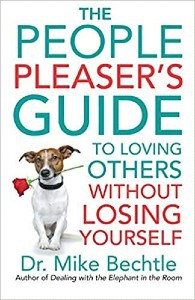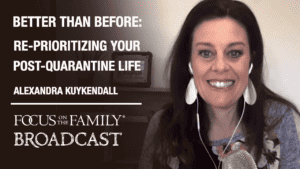Preview:
John Fuller: Well, perhaps you’re a people pleaser or, you know one.
Woman #1: I suppress my feeling, so I’m not a burden to other people.
Woman #2: I think most people don’t like my taste in music, so I let them deejay in the car even if I’m driving.
Woman #3: Uh, I usually avoid conflict all costs.
Woman #4: I invite people over even when I don’t feel like having plans.
Man #1: I give out a ton of compliments to make people like me. Like anything and everything that I can say that is good about them.
Man #2: Sometimes if something difficult comes up, and I need to confront somebody, I make the mistake of accidentally giving them a compliment instead.
Woman #5: I will eat something that I absolutely hate just so I don’t hurt anyone’s feelings.
End of Preview
John: Well, maybe you can relate to some of those comments. Like everyone else, you probably want people to like you, and you care about people who matter to you. But when do you cross that line and become a people pleaser? Well, today on Focus on the Family, we’ll explore what people pleasing looks like and how that can be a harmful behavior in the long run. Your host is Focus president and author, Jim Dal., Thanks for joining us, I’m John Fuller.
Jim Daly: John, this may be one of those issues where you see it distinctly in the other person, but not in yourself. It’s one of those things, the log in the spec. Um, like you said, we all like to be liked. I think that’s probably true of 99% of the human population. Um, but taking care of other people’s needs instead of your own is a biblical sounding thing, right? Jesus said, Love your neighbor as yourself. And so I think there can be a lot of conflict in this area. Uh, the Bible is full of instructions about serving others, putting them first, not being selfish, and so on. So drawing that line between what’s healthy, and what’s unhealthy is our job today with our guests.
John: Mm-hmm. Yeah. And Mike Bechtle is back with us. He’s always popular, every time he’s here, he gets a great response. He’s an author, speaker and blogger. Uh, Mike has been a consultant and coach for Franklin Covey for more than 30 years, and he’s written a book that will kind of serve as the basis for our conversation today, The People Pleaser’s Guide to Loving Others without Losing Yourself. And of course, we have copies of that here at the ministry just stop by focusonthefamily.com/broadcast.
Jim: Well, Dr. Bechtle, welcome back to Focus on the Family.
Dr. Mike Bechtle: Well, thank you. It’s always a privilege.
Jim: I can’t help but call you, Mike. You’re just Mike to me.
Dr. Bechtle: It makes it better for me anyway, so.
Jim: (laughing) Hey, listen, let’s start with your own journey. And where, you were that people pleaser, and you saw that in yourself. Um, what did it look like and how did it play out day to day?
Dr. Bechtle: Well, I think it, uh, happened early. I remember it probably in high school,
Jim: Okay.
Dr. Bechtle: … because I wanted people to like me. And I wasn’t real secure in myself. And so the way that I found security was to get other people to say good things about me. If I could get other people to like me, then I had value. And if they didn’t say things, then I didn’t feel like I had value. So I had to position myself in a way that if I was going to feel good about me, then you had to feel good about me.
Jim: And you worked tirelessly to make sure people felt good about you.
Dr. Bechtle: Oh, yeah.
Jim: Which is the other question that exhaustion you expressed in the book, you felt exhausted doing this.
Dr. Bechtle: Yeah, the longer it went, the harder it was. I would wasn’t sleeping well, I’d have anxiety. But even in the early days, I tried to do things that nobody else was doing, so I would stand out. I remember my first job I worked at a morgue, at a county hospital.
Jim: Hard to get those people to like you.
Dr. Bechtle: Yeah, but it,
Jim: (laughing) I’m just saying.
Dr. Bechtle: … but working with the dead and unresponsive prepared me for a life of public speaking.
Jim: (laughs)
John: (laughing)
Dr. Bechtle: But I was, but even with that, uh, I w- I sold sheet music, um, I worked at, I ran a printing press. I did a drive time radio show in the afternoon. And all that was so people would see me doing something different. But it didn’t help. Because yes, they noticed they were impressed, but I knew they were impressed with what I was doing. Inside I’m thinking yeah, but if they really knew me, they wouldn’t like me.
John: Hmm.
Dr. Bechtle: So I was projecting onto them what I felt about myself, assuming they were feeling the same thing.
Jim: There’s a lot you’re saying there and going back to what John, and I did in the open that idea of the difficulty of identifying yourself as a people pleaser. Um, give us three of those adjectives. I mean, you’re hitting on some of them, but let’s be really plain, so people go, oh, no, I may be one of those. What does it look like to be a people pleaser?
Dr. Bechtle: It’s some of the things we heard in the opening clip, as far as I will take care of you, but I don’t worry about me. I will say nice things to you, if we’re having a conversation, I’m asking you how you’re doing. I’m complimenting you. If you ask me how I’m doing, I’ll answer quickly, and then turn it back around, so I have something else to talk to you about.
Jim: When you describe it that way is some of that just volume, if I could say it that way. You know, I think some of that is healthy. You want, not for the goal of being liked, maybe that’s the distinction. You’re doing it to affirm someone else. But when does that cross that line when you go from, you know, being a pleasant person to be with and affirming somebody, which I think is a good Christian attitude to notice the things that your teenagers doing well and compliment them on that, rather than attack them? But, um, when does it start to become about me?
Dr. Bechtle: I think you hit the nail on the head with the idea of motive, that if I’m doing it, if I’m complimenting you and reaching out to you and meeting your needs, so that I feel better,
Jim: Hmm.
Dr. Bechtle: … that’s where it’s crossed the line. But if I, do it so that you’ll feel better, maybe not just so you’ll feel better, but if I really care about you, that’s biblical.
Jim: Right.
Dr. Bechtle: And I want to care about you. I mean, I grew up… My dad was really nice, I wanted to be nice. And I always felt like I was nice, but I didn’t want to have to be abrasive or rude or obnoxious. And when I finally thought I need to do something about this, I went and read every book I could find on people pleasing. And every one of them said, you have to just forget about other people. You ignore their needs, take care of you, take care of number one. And I thought that doesn’t feel good, because I really do care about people. And that was, that journey was the motive for the book, to do something different than just, can I still be a people pleaser in the biblical way?
Jim: So let me ask you about that in terms of the research you did, where experts said, just forget about other people, concentrate on yourself and, you know, lift up your own needs. That sounds pretty, uh, selfish, I guess. And these are experts, why would they be saying it that way?
Dr. Bechtle: I think as I got into it, I realized they probably weren’t experts.
Jim: Okay. There you go.
Dr. Bechtle: They were people who had that experience, and their way of solving it, which I think a lot of self-help books are kind of that way, it’s like, they figured out something that worked for me, so I write a book about it. And I found more of that than expertise, where it’s like, okay, they learned, I just need to give up everybody else, take care of me, forget about them. And it felt very selfish.
Jim: You know, Mike, it sounds like you’re saying, um, you’ve got to do a good job knowing yourself.
Dr. Bechtle: Yes.
Jim: And that’s critical. And even Jesus said, it’s really hard for us as human beings to know our own hearts.
Dr. Bechtle: Mm-hmm.
Jim: Only the Father knows our heart, right?
Dr. Bechtle: Yeah.
Jim: So that’s a journey in itself, knowing your own motivations for certain things. But again, you know, where Jesus said, remove the log from your own eye before you try to remove the speck from your brother’s eye, right? And so all of that is interesting to me in terms of getting to that motivation again, and why we’re trying to please other people, and you say in the book, that by doing so you’re actually creating a false identity, which for us as Christians, I mean, I’m trying to teach my my boys all the time, your identity is in Christ, your identity is in Christ. This is all tied together.
Dr. Bechtle: Yeah. Oh, yeah. In fact, it goes back to the fact that God created us uniquely. And if we can start capturing that, because there’s a lot of people that say, well, it’s all about what God thinks of you. Your self-esteem should come only from how God made you, you know, what he thinks about you. It’s like, but he made us to be in community. He made us to need each other. He, he used the, that’s why self-help books, um, usually aren’t very good, which scared me because this morning, I happened to pick up my book, I just looked at the back and right next to the barcode, it’s listed as self-help. Great.
Jim: (laughing) Welcome to the writing, uh, hallway.
John: But that really pleases me, Mike.
Jim: Yes.
Dr. Bechtle: Well, good. I can leave now.
Jim: You know, I was, I was just gonna say, I want to, I’ll bring in some illustrations. Jean and I were talking about this ’cause she’s a self-described people pleaser, and she’s far healthier in that regard now, but she was relating some of her high school stories to me where she would say yes to three different guys that wanted to go out with her on the same night, and that doesn’t work. And, uh, I remember one time, she said, this guy had asked her to go out and she just felt bad about it. But she had said, yes, so she went and hid and her mom said she wasn’t home when the guy peeled out of the driveway, in his car, and I was going, you, you did all that stuff. And she, you know, she just was very confessional about those things that really… She told me she helped, uh, two hitchhikers, two guys. I mean, a woman, a young woman pulling… She said, I just felt so guilty passing them on the road, that I stopped to help them. I mean, that is an ultimate people pleaser, right?
Dr. Bechtle: That’s fascinating, because guilt is a big issue for a people pleaser.
Jim: Hmm.
Dr. Bechtle: We do things out of guilt as like, but I can’t say no to anyone, or I can’t displease someone, I have to take the initiative. In fact, if I hear that you’re moving, I will offer, you don’t have to ask me, I will offer to help you move, whether I want to or not, because I want you to see me in that way. I’m positioning. And so it’s not the real me. And that’s, so it’s an integrity issue. It’s not the real me, it’s a counterfeit me. It’s something I am building so that I can project that to you. And it’s an image that is a lot of work to keep up. That’s where the exhaustion comes.
Jim: And I think for her to she just said, you know, it made me feel good to help others but that, it is a me focus thing. And Jean’s Jean, she is in such a better place today, believe me. And some people are going, well, did she, was she people pleasing when she said yes to marry you? (laughs)
John: (laughing)
Jim: That is quite possible.
John: No, it’s true love.
Jim: No, but it’s, it’s one of those things. And in that regard, you mentioned personalities that tend to lean in that direction, types, personality types, what are those types? What are those, uh, frameworks that for some of us, we may lean that way just because of our own wiring?
Dr. Bechtle: You know, I think the most, the simplest one is introverts and extroverts.
Jim: Yeah.
Dr. Bechtle: And a lot of them tie, there’s different levels of that, but introverts tend to be more focused on what they’re feeling, what other people are feeling.
Jim: Interesting.
Dr. Bechtle: Usually an introvert is much more sensitive to what’s going on around them. And they’re thinking about how are other people responding? What do they need? Extroverts think faster. Introverts tend to think deeper.
Jim: Right.
Dr. Bechtle: And so an extrovert can be putting it out there and trying to tell stories and do things to get other people, not to get them to like him, it’s just that’s how they are. So it tends to be a little more on the introvert side.
Jim: Interesting, ’cause Jean leans a little more introverted.
Dr. Bechtle: Yeah.
Jim: So that’s really fascinating. I’m curious, how have you seen people pleasing play out in your marriage and your family? I mean, that’s what we are marriage and parenting. But you know, being a people pleaser to a friend is one thing, but then how does a mom demonstrate that with her kids?
Dr. Bechtle: Well, I think it starts with a marriage when you first meet each other, you’re trying to please the other person. And then after you-
Jim: But some of that’s normal, right?
Dr. Bechtle: Oh, yeah.
Jim: Right.
Dr. Bechtle: But usually, you’re, you may be doing it to attract the other person. But then the, the honeymoon may be over, and you’re starting to try and hold up that image, but you can’t hold it up all the time.
Jim: Right.
Dr. Bechtle: And so the reality of it comes up. But we’re designed to please other people. I mean, even in Philippians, it talks about, consider others more important than than yourselves. And, um, think not only of your own needs, but the needs and interests of others. So it’s very biblical to do that with our spouse, with our kids. And it’s part of how we raise them, that’s our responsibility, is to meet their needs. And that’s not always a positive thing in their minds, but to be focused on them. That’s why the discovery for me when I realized people pleasing is not a bad thing, it’s a very biblical thing. It’s something that can make us, it’s our superpower.
Jim: But again, it’s your motivation.
Dr. Bechtle: Exactly. If I’m doing it, so I’ll feel better about me, that’s a problem. But if I’m doing it because I have found security in my s- inside of myself, from God, from who I am, from how he created me, from my uniqueness, that frees me up now to be the best kind of people pleaser.
Jim: So in that, in that question I asked about marriage and parenting, um, give us some scenarios of how people pleasing may show up in those, you know, close emotionally intimate relationships, you’re, under your own roof.
Dr. Bechtle: Well, I think for me, the one of the biggest ones was I didn’t want to say no to my kids, I wanted them to like me. And so I wasn’t the strong dad in a lot of cases that I should have been, because I didn’t want them to be upset with me. That’s really common I found. And so I wanted them to, I wanted them to see me as the fun dad. I didn’t, my dad was that way. He never, I can’t remember him ever disciplining me in a strong way.
Jim: Right.
Dr. Bechtle: He was always just nice. And I always thought, I want to be nice. But a surgeon is nice, but they also cut when it’s needed. And so that’s, the part that a lot of people miss with their relationship with their kids growing up, it’s like, we need to have the courage and the strength to be able to do what needs to be done, but at the same time mix it with that compassion.
Jim: Yeah, no, that’s good. And I think in the, to your point about the honeymoon in your marriage, when the reality hits, it is impossible to meet those expectations. If you haven’t talked about who you really are, and you don’t know each other well at that point.
Dr. Bechtle: It took us a long time; I think it probably took us about 12 years of marriage before we finally realized we weren’t being honest with each other. We were kind of positioning; we were skirting around issues. And finally, we just started reading a book together. And it was a, a book that about marriage that caused us to just ask questions.
Jim: But what you’re saying there, it wasn’t a deliberate, um, you know, deep mistrust or or a desire to mislead. I mean, you’re just trying to be the best person you can be, but it’s not who you are.
Dr. Bechtle: Well, there’s not a lot, not a lot of instructions that come when you get married. There’s no instructions when you have a kid.
Jim: Yeah.
Dr. Bechtle: Uh, you have to figure a lot of this stuff out. And you’re growing into it. I mean, if I knew now what I knew 44 years ago, when we got married, I would do, would have done things a lot differently. But the reason I know now is because we went through those.
Jim: Yeah.
John: Well, today on Focus on the Family, with Jim Daly, our guest is Dr. Mike Bechtle. And, uh, he’s written the book The People Pleaser’s Guide to Loving Others without Losing Yourself. Uh, it’s a great resource and if you’re not a people pleaser, you know one, I’m sure.
Jim: (laughs)
John: And so, uh, get a copy of this and benefit from Mike’s insights and wisdom. 44 years of learning and putting into practice all of, uh, his people pleasing background. And, um, the book is available at focusonthefamily.com/broadcast or call 800, the letter A, and the word FAMILY.
Jim: Mike in the book you mentioned that one of the great fears that people pleasers face is inadequacy. I think I understand that. But no matter, you know, what success they’re experiencing, or how many compliments they receive, it’s kind of never enough to fill that void. They gotta keep seeking that affirmation. Um, how does, uh, today’s social media, as an example, feed into that problem? Pinterest, you know, I’m o- the women we have on the program, moms are always saying, you know, that’s not the real me, that’s just the perfect me. Uh, speak to that problem of social media and that, and feeling of inadequacy.
Dr. Bechtle: We tend to put our best foot forward on social media. When we get our portraits taken, we smile, whether we feel like it or not. And it, we always publish one where everybody smiled correctly.
Jim: And our eyes were open.
Dr. Bechtle: Exactly.
Jim: (laughing) That’s my problem.
Dr. Bechtle: We don’t see, we don’t s-
Jim: I tend to blink on every photo, I don’t know what that is.
Dr. Bechtle: We don’t, uh, know see the other 200 pictures that were taken first to get that one. And it’s like we want to come across in a certain way. Social media, there’s the comparison. And inadequacy is a huge issue for people pleasers, because we have to be perfect, we have to be liked. And if I look at social media, I’m seeing everybody else’s life. And I compare mine with it and say, well, mine is not theirs, but it’s like I’m not them. And so when we start comparing, it’s really hard to get a good sense of who we really are, and to learn the gratefulness of, for who we are and what we have.
Jim: Well, and that’s important to hit again, because what you’re saying is that feeling of inadequacy is overcome by gratitude.
Dr. Bechtle: Yeah.
Jim: You know, and that we we don’t always make that connection. So if you’re somebody who’s feeling inadequate, you know, I’m not going to the gym enough, you know, that I’m not losing enough weight. All those, and you have this tape playing in your head, how do you move that to gratitude? Lord, thank you for allowing me to eat so much ice cream, I’m overweight. (laughs) What, what do we say to ourselves with, what’s the proper tape we should be hearing in our head?
Dr. Bechtle: I think that it starts with knowing what’s true, with being honest, almost like alcoholics anonymous or anything like that.
Jim: Yeah.
Dr. Bechtle: Admitting the problem, and realizing the truth about it, not skirting around it for myself. I’m not going to announce it on social media, but to be able to recognize the truth of who I am, what’s going on, the choices I’m making, and the choices that I make, or things that I’m doing, it’s not my value, it’s not who God made me. But the gratefulness comes, when I’m intentional about it.
Jim: You have an analogy in the book about a turtle. And I think this makes the point pretty powerfully, the turtle and the eagle or something like that.
Dr. Bechtle: Mm-hmm.
Jim: Remind me what that was.
Dr. Bechtle: We’re often told we need to soar like an eagle. And if I’m a turtle, and that’s how God created me, then that’s going to be really frustrating, because I’m going to spend my whole life thinking I need to soar. They’ve told me that’s what’s important. And so many people tell us what we need to do, and I want to please them, so I’m trying to soar like an eagle. But I can do things as a turtle. If I can learn to accept the fact that God made me a turtle, I can do things that an eagle can’t. I I have ground skills that an eagle would never have. And to be able to understand that.
Jim: No, and I get that. But, you know, even hearing that it, and this may be the Western culture, the American culture. I know we’re airing this globally. So forgive me for this analogy. But here in the US, we all want to soar like eagles. If you played sports in high school, it’s about winning. It’s about soaring, it’s about flying. And God made you as a turtle. I mean, how do we even reconcile that with those cultural bombardments about, I mean, even us as parents, I remember having to pull back with my boys and sports, ’cause I was that f- I was football, basketball, baseball. I played it all. I lettered in all of them. And I’m expecting my two boys that they’re going to be there. But speak to that, that whole winning attitude. You got to reel it in, don’t you?
Dr. Bechtle: Yeah, I came in from the other side, because I was a four-year Letterman in band.
John: (laughs)
Dr. Bechtle: I never played sports. I played the trumpet and what didn’t, it wasn’t until after I graduated, I realized that was not cool.
Jim: Right. But I mean, that is part of it. I remember getting a call from Trent when he told me he won a gold medal in sixth grade. I was like, great. What was it? Chess Club. Wow, that’s awesome. (laughs) I mean… And that’s when it really caught me. I had to realize we’re not going to be wired the same way. And I had to support him, and I did, you know, thankfully.
Dr. Bechtle: I think that goes back to how God creates us each unique. Our strength as an introvert, as an extrovert, as a person, as someone who relates to other people comes from my uniqueness. I think it was John Ortberg who said, we need to become youier. The more, the more we can become the best version of ourselves, that’s where our strength is. And if I can accept what I can’t change, realize this is God’s creation, so the more I try and go outside of that, the harder it’s going to be.
John: Hmm.
Jim: Yeah. Let’s go back to something that I think, uh, you mentioned in the book that connects with so many of us. And that’s that, um, idea that we fear conflict. I think this is broader than a people pleaser issue. I think most human beings, uh, fear conflict. We’re not really wired for conflict in so many ways. And people are rewarded in the culture, in the business community, particularly if you can negotiate, if you can hit conflict head on. And typically you rise in that organization, but I don’t think it comes naturally. Maybe I’m wrong, you’re the doctor. Uh, but what about conflict and its pervasiveness in the culture in humanity, and then how does it become applied to people pleasing where it’s really unhealthy?
Dr. Bechtle: When I was, uh, growing up, I remember seeing older people that were nice, that were pleasant. And I thought people like them. And then I watched people that would get angry, and people didn’t like them. It’s like, well, I don’t want to be one of those. And so I remember working really hard not to be angry, I stuffed it.
Jim: Huh.
Dr. Bechtle: And I always believed I was not an angry person. I thought, no, I, I just don’t get upset. But then I started realizing inside, that anger was eating me away. And I even read a book, a Christian book when I was a teenager that said, anger is a sin, all anger. And so if you are angry, you are displeasing God, so stop being angry. Well, I didn’t want to displease God, so I stopped it. And that means I avoided all conflict, because there was usually anger involved in that.
Jim: Well, it it is quite unhealthy to stuff anger, right? I mean, what’s a healthy, what’s a Christian way to express displeasure? If, I mean, anger has so many shades, and there is sin in anger, I would agree with that. But, you know, if you’re upset about something, that’s one thing, if you’re outright angry, and you’re uncontrolled, I would say that’s in the sin category. But just, you know, what’s a healthy expression of letting off a little steam?
Dr. Bechtle: Well, and I think that’s, where the Scripture says, be angry, but don’t sin.
Jim: Right.
Dr. Bechtle: And so, one of the ways to deal with anger, if I am feeling… My wife and I have learned that if I am really feeling angry, all I have to do is express it. And I don’t have to yell at her, I don’t have to become hostile. I can simply say, right now, I am really feeling angry with you. I need a little space. Give me five minutes, I’ll be back. And she said that was important because she always felt like I was going to leave and never come back. And that we just really had a breach. But-
Jim: Oh, interesting.
Dr. Bechtle: … it built trust, it builds respect, because I can say, I am angry right now, but I, I don’t want to say something that will be hurtful. I don’t want to say something that I really don’t mean.
Jim: You know, as a skill set, why is that so difficult to do exactly what you said? I, you know, I think I still struggle with that being able to catch myself and say, okay, Jean, right now I’m feeling very angry towards you, and I’d like five minutes. It’s, uh, one of the more elusive skills for me. So how how do I concentrate on that and do a better job capturing those emotions and backing up the train?
Dr. Bechtle: Well, I think I, I would slow down a little bit. I would stop and maybe not even say anything for a minute, because if I say it the way you just did, it’s a very controlled sarcasm.
Jim: Right. Exactly.
Dr. Bechtle: It comes across as-
Jim: You noticed.
John: Uh-huh.
Dr. Bechtle: Yeah. Oh, yeah. But it’s like-
Jim: That’s why you’re the doctor.
Dr. Bechtle: … because what we want to do, even if I can just stop and not say anything, it gives me a chance to choose my response. I think the, one of the biggest things we can do with any emotion, when it’s in the middle of it, we can’t come back with logic, because emotion and logic are like oil and water.
Jim: Right.
Dr. Bechtle: And if I just slow it down, and just stop and choose my response, I think if that’s the issue, that’s the first place I would go is learn to make a better trigger. The anger’s, I slow down, I stop and then decide what I’m going to say.
Jim: Yeah, hey, let’s end with a story that you share about yourself, uh, feeling irrelevant as a speaker. I mean, you do a lot of speaking and I can relate to that. But, uh, you, what was going on? And and how did you see the truth in your own perceived, uh, shortcomings?
Dr. Bechtle: I’ve been involved in corporate training for the last 30 years doing seminars in different corporations. And I realized after probably 20, 25 years of doing that, that I could usually capture an audience pretty quickly. But I noticed they were getting younger. It wasn’t me getting older, they were getting younger. But I started to feel like I was a little bit more irrelevant, because who’s the old guy up there? And then a colleague was in the room with me one time and I mentioned it to her, and she said, I don’t think that’s true at all. They see you as the wise college professor, or the grandpa that that they want to know what you have to say. They already give you the benefit of the doubt of wisdom. And as soon as that happened, I realized that was not an issue.
Jim: Hmm.
Dr. Bechtle: But I perceived that it was ’cause I was assuming well I’m getting older so they must think that of me.
Jim: Well, that’s the point, right?
Dr. Bechtle: Mm-hmm.
Jim: Be who you are, live your life and your identity in Christ well, and then trust the Lord for the outcomes.
Dr. Bechtle: Exactly.
Jim: I mean, that’s the beginning of this. Mike, this has been really good. I want to come back the next time and continue the discussion on some of those other attributes, uh, of the people pleaser, and then really get into ways to correct that understanding and help everybody be healthier in this space. So can we do that?
Dr. Bechtle: Absolutely.
Jim: Let’s do it. And let me again, turn to the listeners and the viewers, this a great resource, The People Pleaser’s Guide to Loving Others without Losing Yourself. It’s that fine balance. It’s kind of like that balance between truth and love, right? And it’s in that same category of how do we take care of ourselves, and yet, you know, value others as we value ourselves. And this is one of those delicate areas that sometimes we need a little guidance, to better understand what the Lord requires of us here. So, I want to really encourage you to get this book, and from Focus on the Family. If you can order it through us, all the proceeds will go back to helping in ministry. And if you can make a gift of any amount today, we’ll send it as our way of saying thank you, uh, whether it’s $5 or $50. Um, we’ll send it to you, so it’s a great resource for you and we’ll help other people together.
John: Yeah, donate today, further the work that Focus on the Family is doing to support families and, uh, help people cultivate a deeper relationship with Christ. Request that book from Dr. Bechtle. Again, it’s called The People Pleaser’s Guide to Loving Others without Losing Yourself. Our number is 800, the letter A, and the word FAMILY, or stop by focusonthefamily.com/broadcast. Well, plan to join us next time as we continue the conversation with Dr. Bechtle. And, uh, for now on behalf of Jim Daly and the entire team, thanks for joining today. I’m John Fuller inviting you back as we once again help you and your family thrive in Christ.






















